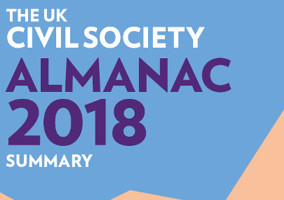The charity sector’s relationship with government is changing, and instead of using the government consultation on a future civil society strategy to ask for more money, the sector should think of new ways to grow pots of money within the sector, NCVO’s policy director said yesterday.
Karl Wilding, director of public policy and volunteering at NCVO, was speaking at the launch of the UK Civil Society Almanac yesterday. He highlighted almanac figures which show that in 2015/16, the proportion of the sector’s income from government fell, and income from local government edged ahead of central government funding.
Wilding said that while many small and medium-sized charities are still reliant on statutory funding, the findings might indicate a “long-term rebalancing away from government income”.
He added that the way government grants are managed now means that there is little difference between grants and contracts. “The way that grants are managed more akin to contracts than grants that we knew a few years ago,” he said.
‘Not a bad thing that the new strategy isn’t about money’
Responding to a question about what should be in the government’s new Civil Society Strategy, which the Department for Digital, Culture, Media and Sport is currently consulting on, Wilding suggested charities shouldn’t just be asking for more money.
He said that before the financial crisis, government funds “created a larger charity sector but they didn’t create a stronger sector”. He urged the sector to be “careful what we wish for”.
He added that there might be ways the government could relieve the burden on charities by “getting out of the way”.
He called on the government to “decide whether it likes civil society or not”, which means accepting the diversity of voices within the sector that might at times be calling for different things.
“You either support this stuff, or you don’t,” he said.
Increase money within the sector
Wilding said that policymakers and the sector need to think about how to “increase the volume of philanthropic capacity available at local level”.
He drew attention to the fact that investment income, which mainly goes to trusts and foundations that make grants to other charities, had not grown much, while other parts of the sector had grown.
This means that “the foundation sector is having to support a bigger number of operational charities”, which are “chasing pool of grants not increasing very much”.
Sir Stuart Etherington, chief executive of NCVO, said that using unclaimed assets to grow community foundations could be “one way” of building capacity.
Related articles











